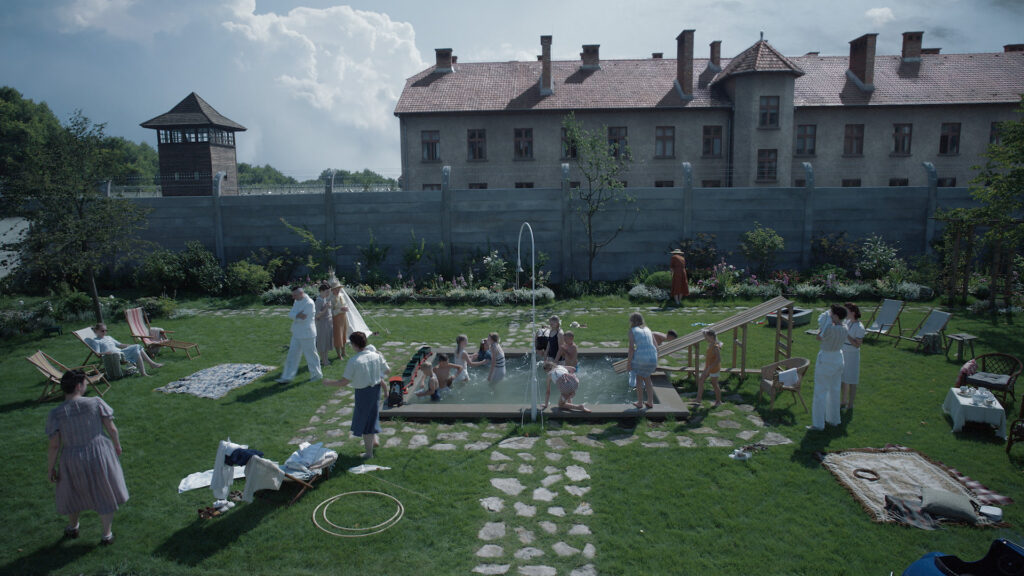How did one of my most anticipated films of the year hold up to all that expectation??
Genre: War/Drama/Period
Premise: A wealthy German family goes about their daily lives living several feet away from the Auschwitz concentration camp during World War 2.
About: This film won the esteemed Grand Prix at the Cannes film festival. Director Jonathan Glazer wanted things to feel so realistic in his film that he set up 10 cameras throughout the home his characters lived in and would do 90 minute takes where the characters would just walk around the house and improvise lines.
Writer: Jonathan Glazer (based on the novel by Martin Amis)
Details: 1 hour and 45 minutes (feels like 5 hours and 45 minutes)

It’s the holiday season.
What better way to celebrate than with a Holocaust movie!?
I’ve been looking forward to this film ever since I heard about it. The premise was so unique. A family living happy unburdened lives several feet from the most death-centric piece of land in human history. The irony was irresistible. People have called it the best horror film of the year.
Well, I checked it out this weekend and, long story short, I’d imagine some forms of heart surgery are more enjoyable than this piece of cinematic torture. I’m canceling the French for endorsing this.
But I’m not going to spend the entire review ripping on it because nobody here is going to see it so what would be the point? Instead, I want to use the film to remind screenwriters of a handful of key screenwriting tips. Because The Zone of Interest is what happens when you ignore the power of good storytelling.
I was debating whether to even write a synopsis for the film since so little happens. But for the sake of context, we follow a family (a father, a mother, and their four young children) who literally live right up against the Auschwitz wall. It turns out that the father is the head administrator of Auschwitz.
The movie follows them through their mundane daily activities, eating or playing in the backyard. The father, Rudolf, who, oddly, is the nicest person in the family, is stressed out by the burden of running his camp. Later in the movie, orders come down to transfer him to another camp. His family stays at the house, though. The climax is Rudolf learning that they need him back at Auschwitz, allowing him to reunite with his family.

By the way, I’m being SUUUUUUUPER generous by making that sound like an actual story. Everything that happens in the script does so randomly. There’s no design behind anything. It’s as if writer Jonathan Glazer threw darts at a dart board for which scenes to write next.
Screenwriting Tip #1: The novelty of your concept runs out quickly. Have a plan for what follows.
The film’s best attribute is the horror that’s happening off screen. We hear the screams. We hear the cries. We hear the gunshots. We see the smoke coming out of the incinerators.
The problem is, the novelty wears off quickly. We get the message in the first ten minutes. With that not working for your movie anymore, what’s your plan to keep us invested? You didn’t have one. You were hoping the off-screen horror would do the lion’s share of the work.
This issue is true for every screenplay. The reader comes for the concept. But the novelty of the concept gets old quickly. Which means you have to come up with an entertaining plot. You have to create compelling characters we want to follow. You have to tell a good story. You can’t rely solely on the concept that got the audience in the door.
Otherwise, make a short film. Which is what Zone of Interest should’ve been.
Screenwriting Tip #2 – Subtlety does not make your script deeper. It makes it more confusing.
The big mistake so many drama writers make is that in their determination to avoid being on-the-nose, they go in the opposite direction and make everything super subtle. These writers then seem surprised when audiences miss key story beats or character motivations.
Rudolf spends the majority of this movie staring off into the distance looking stressed. While Glazer may know what Rudolf’s thinking, how the heck are we supposed to know? Are we mind-readers? This is the problem with being too subtle. We have to guess Rudolf’s thoughts, which means we’re deviating from your, the writer’s, intent.
Is Rudolf scared? Does he feel bad about what he’s doing? Does he want to keep rising in the German ranks? Or is he satisfied with where he stands? We never know ANYTHING because Rudolf never speaks to other characters about how he feels.
Rudolf is just one example of the excessive subtlety in the film. One of the maids may be Jewish. There are subtle hints that this is the case. But we’re never certain. We don’t know if she’s Jewish but pretending not to be. Or if she’s Jewish and the family is aware but letting her work anyway?
Note how either of those scenarios are fertile ground to explore drama. But Glazer ignores both. That’s a running theme throughout this movie. There were so many opportunities to make this a compelling story that were ignored in favor of vagaries and subtleties.
Be clear about things when you’re storytelling. There are times when you want to be subtle, yes. But subtlety only works if we are clear about everything else surrounding the subtlety.
Screenwriting Tip #3 – Put some stakes behind your big plot points.
A major plot point only works if there are stakes supporting it. The lone plot point in this movie is that Rudolf gets transferred. But there are zero stakes attached to it other than he’s going to be traveling away from his family. In a movie about the holocaust, the audience isn’t going to care that the main character is inconvenienced. You need real stakes built into that plot point for it to be effective.
Maybe Rudolf made some major blunder at work, screwing something up enough that it’s being reported to Hitler. The implication is that, if Hitler feels the mistake is bad enough, Rudolf could lose everything. He and his family would be removed from this cushy lifestyle and relocated to some ghetto. You would then play that suspense out over 30-40 minutes. He’s waiting on that decision from Hitler that’s going to determine the rest of his life. That one single change would’ve made this movie five times as interesting.
Without stakes, plot points are lip service. They make it seem like something is happening but the audience doesn’t care because there are no repercussions.
Screenwriting Tip #4 – It’s cause and effect, not effect and cause
This seems obvious to me but I guess Glazer never got the memo. You need to show the cause first AND THEN THE EFFECT. Not vice versa.
A little after the midpoint, Rudolf goes in for a checkup from the doctor. The doctor gives him a basic exam to make sure everything is in order. Then, later on in the film, Rudolf is walking through a building, doubles over, and starts having intense vomiting episodes. It comes out of nowhere (more vagueness instead of clarity). The movie ends quickly afterward.
Consider how much better for the story this would’ve been if they’d shown the vomiting (the cause) first. Now you can draw out the suspense. Does he have a disease? Now that same doctor’s visit (the effect) has more meaning to it. They could find out he’s really sick.
This is Drama 101 but it wasn’t until I saw this movie that I realized some people are so ignorant when it comes to storytelling that they don’t understand the most basic tenets of the trade.
Screenwriting Tip #5 – It’s not “All or Nothing.”
Too many writers think that when they’re writing big Hollywood movies, they should be as big and surface-level as possible all the time. The same problem happens with indie writers. They’re so terrified of betraying their indie sensibilities, they won’t give you a single entertaining plot development in the screenplay.
It’s okay to add thoughtful character development to big blockbuster scripts just as it’s okay to write in entertaining plot developments into your holocaust film. It’s never all or nothing.
In retrospect, I should’ve known The Zone of Interest would be bad. Jonathan Glazer is so artsy, even indie directors find his films pretentious.
Still, I’m left with a longing for what could’ve been. There were so many interesting ways for this story to go. For example, the longer the story goes on, the more we like Rudolf. There’s something borderline sweet about him we connect to. Meanwhile, the wife, Hedwig, becomes less and less likable as the story continues, at one point lashing out at one of the maids by saying her husband could have her ashes scattered all over Auschwitz by tomorrow.
That could’ve been an interesting character study had Glazer committed to it. We think that Rudolf is the monster. But we learn, over time, that Hedwig is the true monster. She’s the one steering the ship from behind the scenes.
Alas, Glazer doesn’t have a single writing bone in his body. It’s too bad. Cause this film could’ve won numerous Oscars if he did.
[x] What the hell did I just watch?
[ ] wasn’t for me
[ ] worth the price of admission
[ ] impressive
[ ] genius
What I learned: While audiences do enjoy doing *some work* in a movie, they don’t enjoy doing *all the work*. If you don’t tell us anything about the characters, if you don’t give us any interesting plot developments, if every scene is too subtle to decode, and you’re hoping we, the audience, will put all that together and come up with some profound feeling about your film for you, you’ve failed. That’s not our job. You have to do the majority of the work as the creator to get us to feel something.

